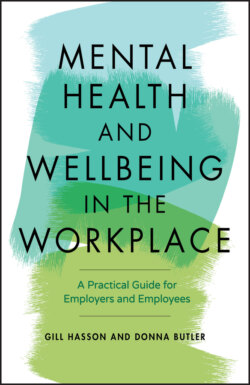Читать книгу Mental Health and Wellbeing in the Workplace - Gill Hasson - Страница 9
1 Understanding Mental Health and Wellbeing Defining Mental Health and Wellbeing
ОглавлениеThe World Health Organization (WHO) defines mental health as: ‘A state of well-being in which every individual realizes his or her own potential, can cope with the normal stresses of life, can work productively and fruitfully and is able to make a contribution to her or his community’.
Our mental health affects the way we experience the world; how we think, feel, and behave towards ourselves and others. WHO defines mental health as a ‘state of well-being’ and just as physical health is intrinsic to wellbeing, so is mental health.
The mental health organization ‘Mind’ suggests that if you have good mental wellbeing you are able to:
feel relatively confident in yourself and have positive self-esteem
feel and express a range of emotions
build and maintain good relationships with others
feel engaged with the world around you
live and work productively
deal with the stresses of daily life
adapt and manage in times of change and uncertainty.
Both Mind and the World Health Organization's definition of mental health refer to a person's wellbeing. But is wellbeing the same as wellness?
When you think about wellness, think prevention and health. When you think about well-being, think happiness.
Susie Ellis. Chair of the Global Wellbeing Institute
Certainly, happiness is important, but there is more to wellbeing than the positive feelings that come with happiness. Both WHO and Mind recognize that wellbeing involves not just happiness, but crucially, the ability to manage difficulties, problems, and challenges; the ‘normal stresses’.
In 2012, Cardiff Metropolitan University Professors Rachel Dodge and Annette P. Daly et al. published their report The Challenge of Defining Wellbeing. Having reviewed and analyzed past attempts by other researchers to define wellbeing, they concluded that ‘it would be appropriate for a definition of wellbeing to centre on a state of equilibrium or balance that can be affected by life events or challenges’. Consequently they define wellbeing as: ‘the balance point between an individual's resource pool and the challenges faced’.
In other words, wellbeing occurs when a person is able to enjoy life and has the resources to draw on to manage life's ups and downs without feeling overly stressed. Therefore, an important component of wellbeing is resilience; the ability to cope with, as well as bounce back and recover from, difficulties and challenges.
